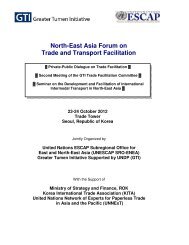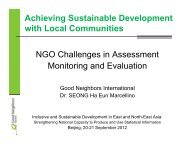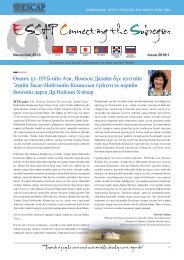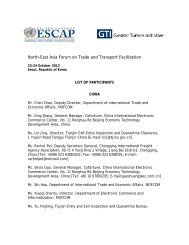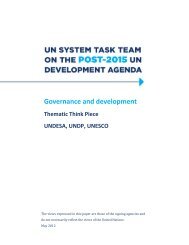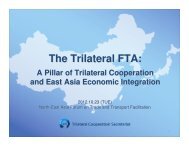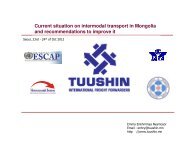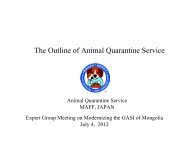- Page 1 and 2:
UNDER EMBARGO UNTIL 03.30 GMT, THUR
- Page 4 and 5:
ECONOMIC AND SOCIAL SURVEY OF ASIA
- Page 7 and 8:
PREFACE The Economic and Social Sur
- Page 9 and 10:
EXECUTIVE SUMMARY FORWARD-LOOKING M
- Page 11 and 12:
on education and health. Indebted c
- Page 13 and 14:
ACKNOWLEDGEMENTS This report was pr
- Page 15 and 16:
CONTENTS Page Foreword ............
- Page 17 and 18:
CONTENTS (continued) Page Australia
- Page 19 and 20:
BOXES Page A. Forward-looking macro
- Page 21 and 22:
FIGURES (continued) Page 1.20. Ineq
- Page 23 and 24:
TABLES Page 1.1. Main destination e
- Page 25 and 26:
References to dollars ($) are to Un
- Page 27 and 28:
ABBREVIATIONS ADB AEC APEC ASEAN AS
- Page 29 and 30:
SOURCES OF QUOTATIONS (a) Page 1: a
- Page 31 and 32:
WHY FORWARD-LOOKING MACROECONOMIC P
- Page 33 and 34:
WHY FORWARD-LOOKING MACROECONOMIC P
- Page 35 and 36:
▲ WHY FORWARD-LOOKING MACROECONOM
- Page 37 and 38:
WHY FORWARD-LOOKING MACROECONOMIC P
- Page 39 and 40:
WHY FORWARD-LOOKING MACROECONOMIC P
- Page 41 and 42:
WHY FORWARD-LOOKING MACROECONOMIC P
- Page 43 and 44:
THE STATE OF INCLUSIVE AND SUSTAINA
- Page 45 and 46:
THE STATE OF INCLUSIVE AND SUSTAINA
- Page 47 and 48:
THE STATE OF INCLUSIVE AND SUSTAINA
- Page 49 and 50:
THE STATE OF INCLUSIVE AND SUSTAINA
- Page 51 and 52:
THE STATE OF INCLUSIVE AND SUSTAINA
- Page 53 and 54:
THE STATE OF INCLUSIVE AND SUSTAINA
- Page 55 and 56:
THE STATE OF INCLUSIVE AND SUSTAINA
- Page 57 and 58:
THE STATE OF INCLUSIVE AND SUSTAINA
- Page 59 and 60:
THE STATE OF INCLUSIVE AND SUSTAINA
- Page 61 and 62:
THE STATE OF INCLUSIVE AND SUSTAINA
- Page 63 and 64:
THE STATE OF INCLUSIVE AND SUSTAINA
- Page 65 and 66:
THE STATE OF INCLUSIVE AND SUSTAINA
- Page 67 and 68:
THE STATE OF INCLUSIVE AND SUSTAINA
- Page 69 and 70:
THE STATE OF INCLUSIVE AND SUSTAINA
- Page 71 and 72:
THE STATE OF INCLUSIVE AND SUSTAINA
- Page 73 and 74:
THE STATE OF INCLUSIVE AND SUSTAINA
- Page 75 and 76:
THE STATE OF INCLUSIVE AND SUSTAINA
- Page 77 and 78:
THE STATE OF INCLUSIVE AND SUSTAINA
- Page 79 and 80:
THE STATE OF INCLUSIVE AND SUSTAINA
- Page 81 and 82:
THE STATE OF INCLUSIVE AND SUSTAINA
- Page 83 and 84:
THE STATE OF INCLUSIVE AND SUSTAINA
- Page 85 and 86:
THE STATE OF INCLUSIVE AND SUSTAINA
- Page 87 and 88:
THE STATE OF INCLUSIVE AND SUSTAINA
- Page 89 and 90:
THE STATE OF INCLUSIVE AND SUSTAINA
- Page 91 and 92:
THE STATE OF INCLUSIVE AND SUSTAINA
- Page 93 and 94:
THE STATE OF INCLUSIVE AND SUSTAINA
- Page 95 and 96:
THE STATE OF INCLUSIVE AND SUSTAINA
- Page 97 and 98:
THE STATE OF INCLUSIVE AND SUSTAINA
- Page 99 and 100:
MACROECONOMIC PERFORMANCE AND POLIC
- Page 101 and 102:
MACROECONOMIC PERFORMANCE AND POLIC
- Page 103 and 104:
MACROECONOMIC PERFORMANCE AND POLIC
- Page 105 and 106:
MACROECONOMIC PERFORMANCE AND POLIC
- Page 107 and 108:
MACROECONOMIC PERFORMANCE AND POLIC
- Page 109 and 110:
MACROECONOMIC PERFORMANCE AND POLIC
- Page 111 and 112:
MACROECONOMIC PERFORMANCE AND POLIC
- Page 113 and 114:
MACROECONOMIC PERFORMANCE AND POLIC
- Page 115 and 116:
MACROECONOMIC PERFORMANCE AND POLIC
- Page 117 and 118:
MACROECONOMIC PERFORMANCE AND POLIC
- Page 119 and 120:
MACROECONOMIC PERFORMANCE AND POLIC
- Page 121 and 122:
MACROECONOMIC PERFORMANCE AND POLIC
- Page 123 and 124:
MACROECONOMIC PERFORMANCE AND POLIC
- Page 125 and 126:
MACROECONOMIC PERFORMANCE AND POLIC
- Page 127 and 128:
MACROECONOMIC PERFORMANCE AND POLIC
- Page 129 and 130:
MACROECONOMIC PERFORMANCE AND POLIC
- Page 131 and 132:
MACROECONOMIC PERFORMANCE AND POLIC
- Page 133 and 134:
MACROECONOMIC PERFORMANCE AND POLIC
- Page 135 and 136:
MACROECONOMIC PERFORMANCE AND POLIC
- Page 137 and 138:
MACROECONOMIC PERFORMANCE AND POLIC
- Page 139 and 140:
MACROECONOMIC PERFORMANCE AND POLIC
- Page 141 and 142:
MACROECONOMIC PERFORMANCE AND POLIC
- Page 143 and 144:
MACROECONOMIC PERFORMANCE AND POLIC
- Page 145 and 146:
MACROECONOMIC PERFORMANCE AND POLIC
- Page 147 and 148:
MACROECONOMIC PERFORMANCE AND POLIC
- Page 149 and 150:
MACROECONOMIC PERFORMANCE AND POLIC
- Page 151 and 152:
MACROECONOMIC PERFORMANCE AND POLIC
- Page 153 and 154:
MACROECONOMIC PERFORMANCE AND POLIC
- Page 155 and 156:
MACROECONOMIC PERFORMANCE AND POLIC
- Page 157 and 158:
MACROECONOMIC PERFORMANCE AND POLIC
- Page 159 and 160:
MACROECONOMIC PERFORMANCE AND POLIC
- Page 161 and 162:
MACROECONOMIC PERFORMANCE AND POLIC
- Page 163 and 164:
MACROECONOMIC PERFORMANCE AND POLIC
- Page 165 and 166:
MACROECONOMIC PERFORMANCE AND POLIC
- Page 167 and 168:
DEVELOPMENTAL MACROECONOMICS: THE C
- Page 169 and 170:
DEVELOPMENTAL MACROECONOMICS: THE C
- Page 171 and 172:
DEVELOPMENTAL MACROECONOMICS: THE C
- Page 173 and 174:
DEVELOPMENTAL MACROECONOMICS: THE C
- Page 175 and 176:
DEVELOPMENTAL MACROECONOMICS: THE C
- Page 177 and 178:
Turkey Hong Kong, China Tajikistan
- Page 179 and 180:
DEVELOPMENTAL MACROECONOMICS: THE C
- Page 181 and 182:
DEVELOPMENTAL MACROECONOMICS: THE C
- Page 183 and 184:
DEVELOPMENTAL MACROECONOMICS: THE C
- Page 185 and 186:
DEVELOPMENTAL MACROECONOMICS: THE C
- Page 187 and 188:
DEVELOPMENTAL MACROECONOMICS: THE C
- Page 189 and 190:
DEVELOPMENTAL MACROECONOMICS: THE C
- Page 191 and 192:
DEVELOPMENTAL MACROECONOMICS: THE C
- Page 193 and 194:
DEVELOPMENTAL MACROECONOMICS: THE C
- Page 195 and 196:
DEVELOPMENTAL MACROECONOMICS: THE C
- Page 197 and 198:
DEVELOPMENTAL MACROECONOMICS: THE C
- Page 199 and 200:
DEVELOPMENTAL MACROECONOMICS: THE C
- Page 201 and 202:
DEVELOPMENTAL MACROECONOMICS: THE C
- Page 203 and 204:
DEVELOPMENTAL MACROECONOMICS: THE C
- Page 205 and 206:
INVESTING IN INCLUSIVE AND SUSTAINA
- Page 207 and 208:
INVESTING IN INCLUSIVE AND SUSTAINA
- Page 209 and 210:
INVESTING IN INCLUSIVE AND SUSTAINA
- Page 211 and 212:
Percentage of GDP INVESTING IN INCL
- Page 213 and 214:
INVESTING IN INCLUSIVE AND SUSTAINA
- Page 215 and 216:
❚ ❚ ✕❚ INVESTING IN INCLUSI
- Page 217 and 218: INVESTING IN INCLUSIVE AND SUSTAINA
- Page 219 and 220: INVESTING IN INCLUSIVE AND SUSTAINA
- Page 221 and 222: INVESTING IN INCLUSIVE AND SUSTAINA
- Page 223 and 224: INVESTING IN INCLUSIVE AND SUSTAINA
- Page 225 and 226: INVESTING IN INCLUSIVE AND SUSTAINA
- Page 227 and 228: INVESTING IN INCLUSIVE AND SUSTAINA
- Page 229 and 230: INVESTING IN INCLUSIVE AND SUSTAINA
- Page 231 and 232: INVESTING IN INCLUSIVE AND SUSTAINA
- Page 233 and 234: INVESTING IN INCLUSIVE AND SUSTAINA
- Page 235 and 236: INVESTING IN INCLUSIVE AND SUSTAINA
- Page 237 and 238: 207 REFERENCES
- Page 239 and 240: REFERENCES REFERENCES Abdyrasulova
- Page 241 and 242: REFERENCES (2012a). The debate on e
- Page 243 and 244: REFERENCES (2012). World Energy Out
- Page 245 and 246: REFERENCES Ma, K-H (2008). Assessme
- Page 247 and 248: REFERENCES (2011b). Child Poverty i
- Page 249 and 250: REFERENCES United Nations, Economic
- Page 251 and 252: STATISTICAL ANNEX STATISTICAL ANNEX
- Page 253 and 254: STATISTICAL ANNEX Table 2. Poverty
- Page 255 and 256: STATISTICAL ANNEX Table 4. Resource
- Page 257 and 258: STATISTICAL ANNEX Technical notes T
- Page 259 and 260: STATISTICAL ANNEX Source: Barro, Ro
- Page 261 and 262: STATISTICAL ANNEX estimates based o
- Page 263 and 264: This publication may be obtained fr
- Page 265 and 266: READERSHIP SURVEY The Macroeconomic



